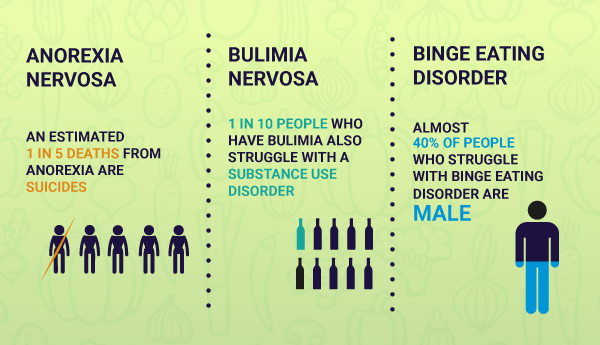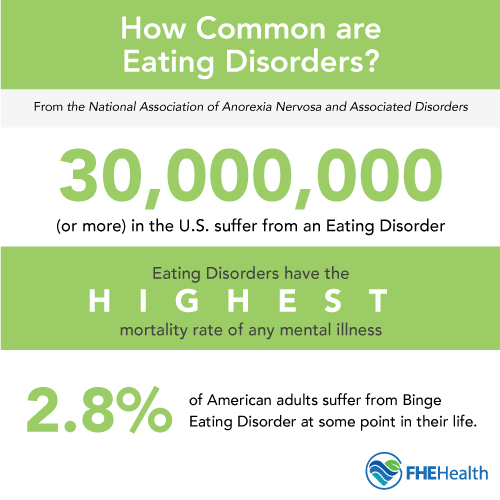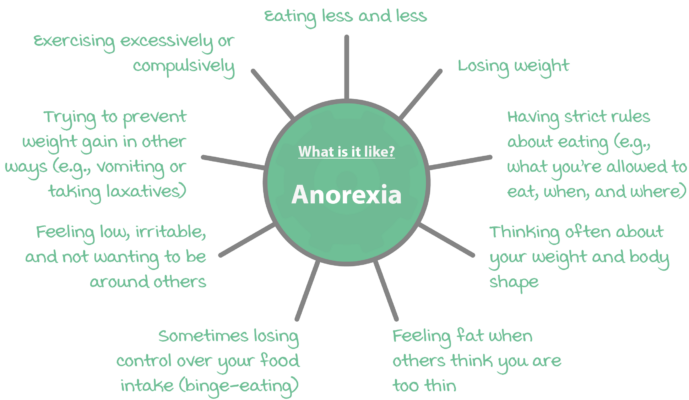The Facts About Eating Disorder Recovery Revealed
Wiki Article
The Ultimate Guide To Eating Disorder Recovery
Table of Contents4 Easy Facts About Eating Disorder Recovery ShownThe Single Strategy To Use For Eating Disorder RecoveryNot known Details About Eating Disorder Recovery The 25-Second Trick For Eating Disorder RecoveryThe Of Eating Disorder Recovery

While several individuals make a point to be conscious of the components and sourcing of their food, orthorexia can come to be harmful to the person's health. At some point, specific foods or whole groups are eliminated from the individual's diet regimen; they could additionally start to consume over the active ingredients in their foods, spending hrs each day preparation meals.
Food active ingredients may additionally come to be the person's just topic of discussion. Health repercussions might include a variety of intestinal and nutritional inequalities. It can additionally trigger a lot of the exact same wellness threats as anorexia nervosa, as the individual's caloric consumption may be badly restricted. Orthorexia is likewise a common co-occurring problem connected with OCD.
7 Easy Facts About Eating Disorder Recovery Shown
With this condition, a person will strictly stay clear of particular foods to the detriment of their wellness - eating disorder recovery. Unlike orthorexia, however, the avoidance of particular foods isn't driven by ideas of the food's healthiness or pureness, yet instead by an extreme hostility to the food's taste, structure, or smell (although problems regarding spoilage or gastrointestinal disorder may also be existing).Over time, an increasing number of foods end up being untenable, leading to a very restricted combination of acceptable foods. Previously called careful eating disorder, ARFID frequently starts in youth as well as considerably gets worse with time. It's reasonably common for children to be "fussy eaters" as well as everyone has preferences wherefore they eat, yet if it becomes uncontrollable and harmful to a person's health and wellness, it calls for a check-in with an eating condition therapy specialist.
Likewise like orthorexia, an adverse or altered body image is not always a reason of the disorder. ARFID is generally treated using talk treatment and cognitive re-training such as Cognitive Behavior Modification (CBT). Unlike a lot of eating conditions which usually first existing throughout teenage years, rumination disorder is most common in infancy and early childhood, although it can continue right into the adult years.
Not known Facts About Eating Disorder Recovery
Generally, they do not experience anxiety or disgust when regurgitating, nor do they appear to make an initiative to throw up (as seen in bulimia nervosa). Rumination condition is often a reaction to an irrational worry of health problem brought on by consuming, although its reasons are less well-understood than other eating navigate to these guys conditions.

Orthorexia is a form of consuming problem, still unacknowledged in the DSM, where an individual comes to be stressed with "healthy and balanced consuming." While many individuals emphasize to be aware of the ingredients and also sourcing of their food, orthorexia can come to be harmful to the individual's health and wellness. Orthorexia triggers individuals to identify details food or food groups as "appropriate," "healthy," or "pure." Ultimately, certain foods or whole groups are eliminated from the individual's diet regimen; they could additionally start to obsess over the ingredients in their foods, spending hours each day preparation dishes.
The smart Trick of Eating Disorder Recovery That Nobody is Talking About

With this disorder, an individual will purely prevent particular foods to the hinderance of their health and wellness. Unlike orthorexia, however, the evasion of specific foods isn't driven by notions of the food's healthfulness or purity, yet instead by a severe hostility to the food's taste, structure, or smell (although issues concerning putridity or gastrointestinal disorder may likewise exist).
Over time, even more as well as even more foods become illogical, bring about a very limited scheme of appropriate foods. Formerly known as discerning eating condition, ARFID commonly starts in childhood and also considerably gets worse gradually. It's reasonably typical for kids to be "particular eaters" and everybody has preferences for what they consume, however if it becomes uncontrollable as well as destructive to an individual's health, it requires a check-in with an eating condition therapy professional.
The Eating Disorder Recovery Ideas
Additionally like orthorexia, an adverse or altered body picture is not always a cause of the problem. ARFID is typically treated making use of talk treatment as well as cognitive retraining such as Cognitive Behavior Modification (CBT). Unlike the majority of eating conditions which typically first existing during adolescence, rumination problem is most usual in early stage and very early news childhood years, although it can continue into their adult years.Usually, they do Homepage not experience stress and anxiety or disgust when throwing up, neither do they show up to make an effort to throw up (as seen in bulimia nervosa). Rumination disorder is frequently a response to an unreasonable fear of health problem triggered by eating, although its causes are much less well-understood than various other eating problems.
Rumination disorder is noted in the DSM-V. One of one of the most harmful kinds of eating condition, ED-DMT1 (informally called diabulimia), occurs when an individual with type-1 diabetic issues deliberately misses their insulin dosage to reduce weight. Diabulimia is detailed as one of the many undefined consuming conditions under the catchall term OSFED (Various other Specified Feeding r Eating Problem).
Report this wiki page